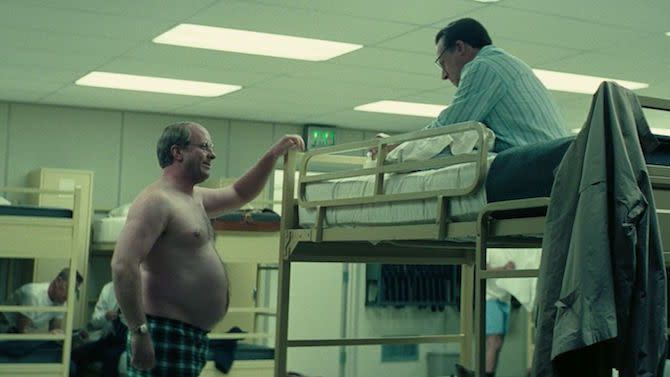The hidden danger of Hollywood's obsession with actor transformations

Every time a Hollywood actor talks about the extreme weight loss or gain they committed to for a role it becomes a trending topic.
Just this week, Joaquin Phoenix discussed the body transformation he went through to become the Joker and sure enough, headlines revealing just how much he lost dominated news feeds.
The same went for Christian Bale earlier this year, as news stories flooded social media that focused on his weight gain for the role of Dick Cheney in Vice, and the methods by which he achieved it.
Back in 2006, Beyonce appeared in Dream Girls and revealed that she used the Master Cleanse diet to lose weight and female-focused media outlets were quick to share how to replicate it.
Thirteen years later there are still websites writing stories about it and encouraging readers to try the fasting regime themselves, despite the negative consequences of starving yourself.

The actors, of course, aren’t revealing these diet details to inspire the public to follow suit though they may well be doing it to bait Oscar recognition.
Hollywood loves the idea of an actor “suffering for their art” and it certainly paid off for Jared Leto and Matthew McConnaughy (The Dallas Buyers Club), Charlize Theron (Monster), Natalie Portman (Black Swan) and Robert DeNiro (Raging Bull) who each won Oscars for their transformative turns.
Even Bale earned a Best Actor nomination for Vice as well as American Hustle (2013) which he gained weight for and won Best Supporting Actor for The Fighter (2010) that saw him slim down to the extreme.
Read more: Charlize Theron debuts new Fast 9 look
But given the influence of celebrities and diet culture should more care be taken with how they talk about this part of their preparation and how it is reported?
Diet and weight loss culture has evolved over the years as the conversation around body image, health and beauty has moved to become more inclusive instead of championing “the thin standard”.
Body positivity influencers like Stephanie Yeboah, the singer Lizzo and body neutrality campaigner and actor Jameela Jamil are some of the loudest voices in the fight to do away with old-fashioned conventions regarding body shape.
Jamil, known for her role in The Good Place, has even inspired Grazia Middle East to no longer write about weight loss in its pages or online, however, the UK diet industry market is estimated to be worth over £157 million and growing, while statistics show eating disorders are having a more damaging effect.
Here is my essay on the evils of the diet industry, how it works and what the long term effects of it are for so many of us. https://t.co/VU1D2RdkCo pic.twitter.com/HcdlFz3cfw
— Jameela Jamil 🌈 (@jameelajamil) September 2, 2019
According to the NHS, there has been a huge rise in the number of hospital admissions for potentially life-threatening eating disorders with the figure more than doubling from 7,260 in 2010-11 to 16,023 in the last year to April 2018.
Read more: Jason Statham wants Guy Ritchie for Hobbs & Shaw 2
Eating disorders can develop from biological and genetic factors but also, in some cases, be influenced by cultural components which the media sometimes amplifies.
Eating disorder charity Beat says that “the specific influence of these cultural ideals on people at risk of eating disorders is that they maintain and perpetuate the illness, rather than cause it.”
“The way weight loss or gain is reported by the media or spoken about by a celebrity would not be the sole and direct reason for someone developing an eating disorder,” a Beat spokesperson told Yahoo Movies UK.

“However, there is a strong likelihood that people who are or have been affected by eating disorders would find frequent references to weight gain or loss and to calories intake triggering and distressing.”
So how can actors and filmmakers talking about body transformations be more careful in what they relay?
Though its guidelines were written for reporting on eating disorders, Beat says elements can be applied to the way people talk about dieting too especially “specific weight.”
“People with eating disorders speak about being ‘triggered’ – how their eating disorder behaviour and negative mental state can be stimulated, encouraged or reinforced by certain words, images or situations,” the guidelines state.
“Any mention of the lowest weight a person was at is unhelpful. Similarly, mention of specifically small amounts eaten e.g. ‘lived on half an apple a day’ would act as an encouragement to restrict or purge.”
For more information on eating disorders visit Beat’s website.

 Yahoo Movies
Yahoo Movies 
